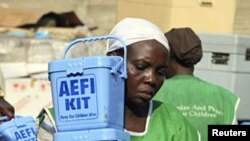International health officials have declared polio a public emergency, following a spike in cases in nations where the virus was once thought to be nearing elimination. The World Health Organization, or WHO, said that the highly infectious disease, which attacks the central nervous system and can quickly cause total paralysis, could spread widely if concerted action isn’t taken to combat it.
Northern Nigeria is a special focus of concern. After cases were reduced by 95 percent as recently as two years ago, the disease is re-emerging there as a major threat, with an almost four-fold increase in cases reported across eight northern states since the beginning of the year. Children are especially susceptible to the disease. Among those paralyzed, one in ten die when their breathing muscles become immobilized.
The Nigerian government is responding to the crisis with a Presidential Task Force on Polio Eradication. Officials there have launched a vaccination campaign, and local authorities are being encouraged that all cases in their areas be investigated and reported. Beginning in early April, the immunization effort hopes to provide 57.7 million Nigerian children with two drops of oral vaccine each.
To reduce the risk of transmission of the virus that causes polio, oral vaccine coverage must be sustained for a number of years. The recent flare-up is believed to have been caused by a falling off in participation in such annual dosages. The new campaign aims to address these gaps and boost the population’s immunity levels. An American charitable organization, the Bill and Melinda Gates Foundation, is promoting the effort by funding the hiring of hundreds of Nigerians to carry out the vaccination campaigns.
The U.S. Centers for Disease Control and Prevention is also helping, providing scientific and technical assistance to the Federal Ministry of Health, WHO, UNICEF and other health organizations to support local polio eradication efforts. These include a campaign to reach nomadic groups.
The experience of India demonstrates that polio can be defeated through vaccinations and health awareness. Once regarded as the epicenter of polio, India, a nation with seven and a half times the population of Nigeria, was declared to be free of the disease in January. With firm commitment by state and local authorities and the cooperation of Nigerian citizens, Africa’s most populous nation may achieve similar results.
U.S. Committed To Helping Nigerians Fight Polio

International health officials have declared polio a public emergency.












